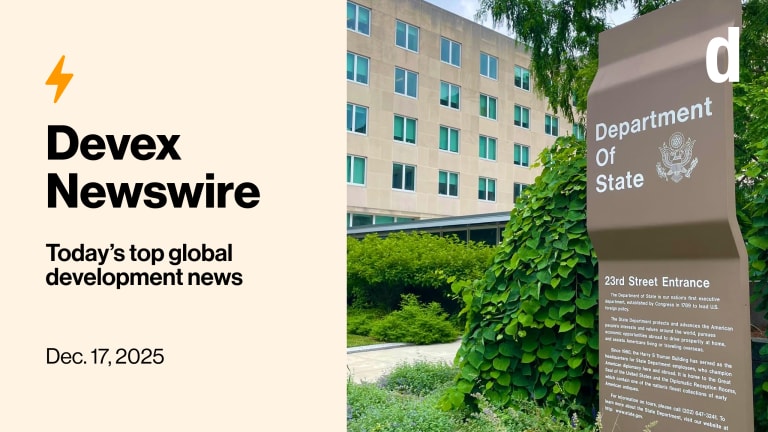I've been convinced on the need for DFID independence, says Alok Sharma

LONDON — The United Kingdom’s development secretary, Alok Sharma, has reassured politicians that he supports an independent Department for International Development — having previously been on the fence about the controversial issue — adding that aid spent by other government departments needs stronger governance.
Appearing before members of parliament’s International Development Committee for the first time on Monday, Sharma moved to dispel fears about the possibility of DFID being merged with the Foreign & Commonwealth Office — something Prime Minister Boris Johnson proposed in January before he took office.
“My personal view very much is that [DFID] should continue as an independent department,” Sharma, who has been in the job for three months, told members of the cross-party select committee that scrutinizes U.K. aid spending.
Sharma said he had been converted from an “agnostic” on the merger issue to a DFID “champion,” having been impressed by the department’s staff and its strong reputation among international development actors. A number of “external parties” also convinced him that DFID should remain an independent department with a “seat at the cabinet,” he said.
However, Labour MP Richard Burden, who sits on IDC, was not entirely reassured. “Let’s hope you’re able to convince the prime minister in his current role of that same view,” he said.
DFID has been an independent department for 20 years but the debate over its future has been growing alongside aid skepticism. Former DFID chief Penny Mordaunt, who was in the role until April, repeatedly said she did not see the department as fully independent.
Members of Parliament also quizzed the new DFID boss over the aid department’s role in ensuring that official development assistance spent by other government departments retains its poverty focus. IDC has previously said it wants DFID’s secretary of state to have ultimate oversight and sign-off on all aid spending — a suggestion the government has rejected.
Sharma agreed that stronger oversight of ODA spending is needed but stopped short of saying that DFID should have sign-off.
He said the department will be beefing up its efforts to support other departments to spend ODA effectively and that it has already seconded 160 staff to help other departments. The department also received an extra £20 million ($26 million) for its operating budget from the Treasury in the September spending round, which will be used to support this work, he said.
Matthew Rycroft, DFID’s permanent secretary, who was also at the IDC session, told MPs that his department continues to offer its “expertise, resources and systems” to other ODA spending departments, but said that “some have taken it up more fully than others.”
Sharma also provided MPs with more details about the number of DFID staff seconded to other departments to work on Brexit. The department is prepared to deploy up to 600 staff, he said — 200 from the London office, 200 from Scotland, and 200 from overseas posts. To date, just under 200 staff have been deployed, or are about to deploy, he said, adding that this would not detract from DFID’s work.
“We’ve been very keen to be forward leaning and [help] other government departments … but at the same time I want to ensure we are continuing to do the core of what DFID is about,” he said.
DFID has so far declined to provide full details of how it is ensuring “core work” can continue despite the secondments.
Read more on the debate over DFID's independence:
► IDC chair Stephen Twigg warns of wide-ranging risks to UK aid
► DFID and UK aid still under threat, experts warn
Search for articles
Most Read
- 1
- 2
- 3
- 4
- 5








